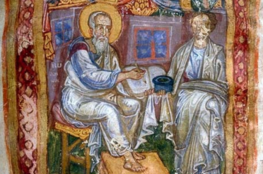Things slow down this time of year. If you don’t believe me, then click over to the pop-culture website The Outline which ran a story last week on Death to the World (DTW), the Orthodox zine that comically blends superficial Eastern Christian content with a hardcore-punk aesthetic. Started in 1994 in association with the then-schismatic St. Herman of Alaska Monastery in Platina, California, the zine’s name, which in substance means detachment from “all earthly cares,” is meant to appeal to angry, disenfranchised, and largely uneducated young men for whom “death to the world” means a nihilistic disdain for all humanity. More grotesque still is the zine’s frequent use of skulls, graves, and other dark imagery not for the purposes of memento mori, but simply to look “cool.” In many ways DTW’s cheap antics are similar to numerous anarcho-punk and crust bands using pictures of war crimes and other atrocities on their 7” sleeves, ostensibly to “send a message.”
Missing from The Outline’s overview of the zine is any mention of the numerous problems associated with St. Herman’s, not the least of which being its willingness to shield its abbot Gleb “Fr. Herman” Podmoshensky from accusations of sexual impropriety. St. Herman’s and DTW are also shameless propagandists for Fr. Seraphim Rose, a homosexual Eastern spiritualist-turned-Orthodox monk who is best known for penning a series of intellectually fraudulent books on everything from UFOs to a literalist interpretation of the Book of Genesis. Rose, more than any other Orthodox crackpot writing in English, is responsible for anti-Catholic prejudices among American Orthodoxy’s convert culture and the cult of worship that surrounds him still has frustrated any sincere inquiries into his alleged holiness. It is telling that Rose’s home jurisdiction, the Russian Orthodox Church Outside of Russia, has yet to canonize him despite the circulation of icons, akathists, and other pious practices in his honor.
As for DTW itself, despite failing to attract many subscribers in the 1990s, it now enjoys a second life as a web-zine while peddling clothing clearly meant to imitate the attire of black-bloc anarchists. How much of an impact DTW still has is difficult to measure. American Orthodoxy has a time-honored tradition of artificially inflating its numbers even though it is missing an entire generation of adherents due to intermarriage or apathy. While noble efforts have been made over the past several decades to turn Orthodoxy away from being a boutique religion for bored white people and/or an ethnic social club, the sad fact remains that Orthodoxy in America remains splintered along cradle/convert and nationalistic lines. As for giving Orthodoxy some intellectual gravitas in the Anglophone world, it should come as little surprise that the scholarly efforts of the late Frs. Alexander Schmemann and John Meyendorff are often held in contempt by those associated with DTW and its followers. For them, Orthodoxy is a pseudo-rebellious religious posture with candles and exotic pictures; nothing further need be known.
Instead of being the subject of a positive news article, DTW ought to be derided by serious Orthodox Christians who have no interest in having their religion reduced to a fad. Those who find their way to Orthodoxy through DTW and other similar resources are likely to enter with a woefully incomplete and despicably inaccurate picture of what the Orthodox Church is. This is not what Orthodoxy needs, particularly in the United States where fervent religiosity often takes the shape of barking-mad hysterics. Of course, Orthodoxy is not alone in suffering through attempts to blend its character and traditions with disposable convictions and self-important posturing. I used to listen to Pedro the Lion after all.




December 30, 2016
I read several issues of “Death to the World” in the 1990s, but I think that I was too square to be in its target audience. I was in my 20s, a recent convert to the Orthodox Church: I was an aficionada of Victorian/Edwardian/retro stuff, and as far from punk as could be imagined. I wrote to the magazine, suggesting that they write articles that would focus on how young people who were already Orthodox Christians could lead holy lives in the world, but they gently rebuffed me, telling me that that was not their focus. I did not know that it had been revived. I hope that they address themselves more to young Orthodox Christians and not try to chase the punk scene as much.
January 1, 2017
As much as I want to agree with you on DTTW, bringing Fr. Seraphim Rose into this is a seemingly gratuitous dragging through the mud of a man who’s reputation already stuffers enough from those who claim him as their inspiration.
First, what relevance does Fr. Seraphim’s homosexuality have to DTTW or St. Herman’s monastery? By all accounts he was chaste after his conversion to Orthodoxy and lamented over his past sins for the rest of his life. Second, Fr. Seraphim Rose was never a “spiritualist”. He was a Taoist and a Perennial Traditionalist before his conversion, and rejected both upon his discovery of Christ. Third, focusing only on his books, which admittedly have their problems, ignores the wealth of translations, many of which cannot be found in English otherwise, and non-polemical literature he produced. Forth, saying Fr. Seraphim is responsible more than anyone else for anti-Catholic prejudice among American Orthodox is a stretch. His writings on St. Augustine of Hippo are enough to show this, considering the attitudes of many of his contemporaries and modern day Orthodox theolgians towards both St. Augustine and the entire Latin tradition. Finally, which is it? Are all inquires into his alleged holiness being shut down, or is ROCOR taking its time? ROCOR has, with one major exception, taken an average of 60-70 years after someone’s repose to canonize them. Plus, his potential relics are now in the possession of the Serbian church.
I say this not as someone looking to uncritically defend Fr. Seraphim (or Fr. Herman and DTTW at all for that matter), but to provide a potentially more balanced view.
January 2, 2017
Fr. Seraphim’s reputation (like American Orthodoxy, in general) suffers, both justly and unjustly, from many a cultured despiser. I wouldn’t consider him reliable for much in the way academics or intellectual rigor, but my parish has a historic connection with him as well as St. Herman’s Monastery. I have a couple of dear friends who knew Fr. Seraphim and their testimony convinces me more of his genuine metanoia (if not sanctity) than his books or articles, or reputation, for that matter.
I also say this as someone who has no patience for the sort of twaddle propagated by DTW or even Fr. Seraphim himself.
January 2, 2017
First, DTTW has been a major promoter of Fr. Seraphim’s works and views since its inception. In fact, its origins are connected to an attempt to place an article about Rose in the punk zine Maximum Rock n’ Roll, so mentioning him is fair game.
Second, Rose’s past spiritual exploits more than informed his Orthodox-era writings. His reading of the Fathers, especially in Genesis, Creation, and Early Man borders on ludicrous, particularly his strange belief that they were somehow divinized special knowledge about the Scriptures.
Third, Rose may have had an appreciation for certain Latin Fathers, but that’s not entirely novel. However, when you read his thoughts on, say, Thomas Merton, it’s pretty clear he never even read Merton (or didn’t read him that closely). Rose’s general thinking on Catholic spirituality and theology was riddled with prejudices — prejudices which have trickled down across the Orthodox spectrum to this day.
Last, I think a clear eye of Rose’s past is important for understanding who he was. While I agree with you did undertake some important translations, that does not excuse the fact that he was, by and large, an intellectual hack who wrote on topics he knew little about. Whatever gifts he had in linguistics and Asian philosophy does not paint over the fact he was a theological crank.
January 2, 2017
I didn’t say mentioning him wasn’t fair game. Mentioning his homosexuality without any further explanation, especially in a post that highlights the sexual wrongdoings of his monastery’s abbot, is misleading.
I haven’t read Genesis, Creation, and Early Man (which was edited and released after his death); but what you’re describing as his views on how the Fathers interpreted scripture sounds remarkable like Fr. John Romanides, who I have read.
My experience dealing with anti-Catholicism within Orthodoxy has comes from a completely different place. I don’t doubt your experience, but castigating Fr. Seraphim as the end all be all of this phenomenon is extreme.
I can accept your view that Fr. Seraphim was a bad theologian, but calling him an intellectual hack and crank is just insulting and doesn’t contribute anything to this or any dialogue on the merits of Fr. Seraphim’s life and work.
January 3, 2017
I agree with you Samuel.